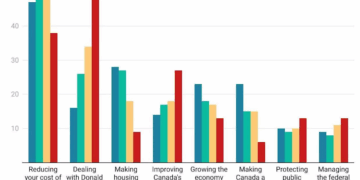
“My biggest concern,” said Supreme Court Justice Ketanji Brown Jackson during oral arguments in Murthy v. Missouri in March, “is that your view has the First Amendment hamstringing the government in significant ways.” This comment virally raised eyebrows, and for good reason: The Constitution’s whole purpose when crafted was, and still is, to hamstring government. After all, when we don’t hamstring government, government will hamstring the people.
This comes to mind with a warning issued by Brian Knight, director of Innovation and Governance and a senior research fellow with the Mercatus Center at George Mason University. In a recent piece titled “We can’t be a republic only when it’s convenient,” he discusses another case, National Rifle Association of America v. Vullo, in which the defense essentially argues that abiding by the Constitution would hamstring government.
In this case, the “NRA, joined by the ACLU, alleges that Maria Vullo, former Superintendent of the New York State Department of Financial Services, abused the power of her position to punish the gun rights organization for its political positions,” Reason related in March.
“‘Vullo met with executives at Lloyd’s of London to discuss her views on gun control and to tell them she believed the company’s underwriting of NRA-endorsed insurance policies raised regulatory issues,’ according to Abby Smith of the Foundation for Individual Rights and Expression (FIRE),” the site continues. “‘She told them Lloyd’s could “avoid liability”—but only if the company told its syndicates to stop underwriting their insurance policies, and joined her agency’s “campaign against gun groups.”’”
What’s at stake here, as Reason puts it, “is the point at which efforts to persuade private companies they ought not offer platforms to certain speakers morph into ‘nice business you got there; it’d be a shame if something happened to it.’” In other words, New York’s actions smack of the fascist model, where big government compels big business to do its bidding and help enforce state policy.
Despite this, supporters of N.Y.’s behavior “argue that if this were found to violate the First Amendment, it would risk making the financial system less safe and chill the ability of prosecutors and regulators to act,” writes Knight.
“These arguments boil down to the idea that fully enforcing the Constitution would make the government’s life too hard,” he continues. “That if regulators’ and prosecutors’ actions were subject to First Amendment scrutiny — and if bank and insurance regulators have their broad assertions of discretion questioned — they wouldn’t be able to function like they currently do, risking financial instability.”
Knight points out that, first, the above is a convenient rationalization, one outlining a most unlikely scenario. But it’s also beside the point because the Constitution isn’t there to make government’s “life” easy, but to make the people’s lives safe from easily exercised government control.
Of course, many make the case that government “must be able to address problems.” But to behave as if constitutional limitations don’t matter is to embrace “good ideaism,” the notion that it’s fine for state action and judges’ rulings to be governed by whether a proposal achieves a desired end; under this thinking, constitutional strictures are mere impediments to be circumvented via clever lawyer-craft rationalizations.
Is this justifiable? To expand upon an example Knight uses, compelling every American to wear a GPS tracker and have a government-monitored security camera in each room of his residence would greatly help to effect the desired end of eliminating crime. This doesn’t mean it should be done.
Overlooked, too, is that whenever a judge, politician, or someone else habitually tramples the Constitution to enable an agenda, he’s making up his own rules. Why? Because if I did make up my own rules, I’d only make up rules I liked. So when I say I’m only going to follow the rules I like, I’m essentially making up my own rules.
As to this, the Constitution is ignored because it’s an “inconvenient document” (for some). But as Knight puts it, “The court deferring to convenience would negate” the obligation to abide by constitutional limits “and risk us increasingly exchanging liberty for not even security, but mere bureaucratic ease.”
“The Constitution is far from perfect,” he later concludes, “but it’s vastly superior to a rule of government convenience.”
This is the point, too. Whose convenience? Government’s. Critics of constitutional adherence might have a smidgen of a point if, as they sometimes claim, we’re being “hamstrung” by a 237-year-old document that’s set in stone.
But we’re not.
For there’s not just an amendment process, but two amendment processes, through which the Constitution can be altered if it truly hampers capacity to address contemporary problems. These processes are by design long and involved, to maximize the chances that changes made don’t reflect just a fit of emotionalism. They are thus a safety measure, a legally mandated “take a deep breath and count to 10.”
This, mind you, helps explain why so many pseudo-elites dislike the Constitution: By making it difficult to change the status quo, it is by definition a conservative document.
They also dislike recourse to the amendment processes; this is because it involves the people, as the vast majority of our representatives must agree on a change for it to become an amendment. The pseudo-elites would much rather effect their agenda via judicial fiat or bureaucratic regulation.
So the truth is that we do have a “living constitution.” But here’s what’s unsaid: It’s meant to be dormant — until the people decide when and how it will exhibit live action.
Shop For Night Vision | See more…
Shop For Survival Gear | See more…
-
Sale!

Japanese 6 inch Double Edged Hand Pull Saw
Original price was: $19.99.$9.99Current price is: $9.99. Add to cart -
Sale!

Portable Mini Water Filter Straw Survival Water Purifier
Original price was: $29.99.$14.99Current price is: $14.99. Add to cart -
Sale!

Mesh Shooting Hunting Vest with Multi Pockets
Original price was: $59.99.$39.99Current price is: $39.99. Add to cart

































 Reaction & Commentary
Reaction & Commentary












